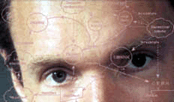PALO ALTO -- For the Web world of information,
the Internet is the plumbing underneath. Any advances in the Internet should just
make everything work faster and better. Some of the things which people are working
on are for example mobile Internet, so you can keep an IP address while you wander
around.
 Let
me point out that the WWW just uses the Internet like a bridge uses electric power.
Very interactive web sites which use a lot of multimedia may be fun but they have
disadvantages. They raise the bar for ordinary people who want to create content.
They are difficult for search engines to index and analyze and very difficult
for disabled people to read unless you design them carefully. They may be incomprehensible
to librarians in 200 years time.
Let
me point out that the WWW just uses the Internet like a bridge uses electric power.
Very interactive web sites which use a lot of multimedia may be fun but they have
disadvantages. They raise the bar for ordinary people who want to create content.
They are difficult for search engines to index and analyze and very difficult
for disabled people to read unless you design them carefully. They may be incomprehensible
to librarians in 200 years time.
I was very positive about the start up of Netscape, as
commercial support for the Web. It was something which I had been trying to encourage
for a long time, and it was a relief when software companies started to develop
product applications that were consistent and intuitive with the universe of information,
some part of which one sees through a computer screen, whether it be a pocket
screen, a living room screen, or an auditorium screen.
Some Web sites will not allow you to enter unless
you agree to have a cookie attached to your to link that has your identity tag
no it. Otherwise, you couldn't asked a question without logging in with a password
every time. When I open a bank account I don't mind getting (and providing) my
account number. What I want to be able to do, though, is get an assurance from
the web site about the way my personal data -- which is associated with that cookie
-- will or will not be used. We have a project called P3P (http://www.w3.org/P3P/
) to allow a browser and server to do that automatically.
Now, 3 or 4 out of 10 people are using the web on
a regular basis. Older part of the population will be more comfortable with the
technologies that are available. In fact, growth had been very strong in the senior
sector. It has surprised many people (one I talked to yesterday) how fast their
parents pick it up. We have to make the computer itself simpler and cheaper. But
that is coming.
[Editor's Note: View a proposed Code
of Ethics & Standards of Practice. Tim Berners-Lee is the director of the
World Wide Web Consortium, which serves as the coordinating body for Web
development. Dr. Berners-Lee graduate of Oxford University, England and
is now with the Laboratory for Computer Science ( LCS)at the Massachusetts Institute
of Technology ( MIT). He directs the W3 Consortium, an open forum of companies
and organizations with the mission to realize the full potential of the Web. With
a background of system design in real-time communications and text processing
software development, in 1989 he invented the World Wide Web, an internet-based
hypermedia initiative for global information sharing while working at CERN, the
European Particle Physics Laboratory. Before coming to CERN, Tim was a founding
director of Image Computer Systems, and before that a principal engineer with
Plessey Telecommunications, in Poole, England. Tim is married to Nancy Carlson.
They have two children, born 1991 and 1994.]





